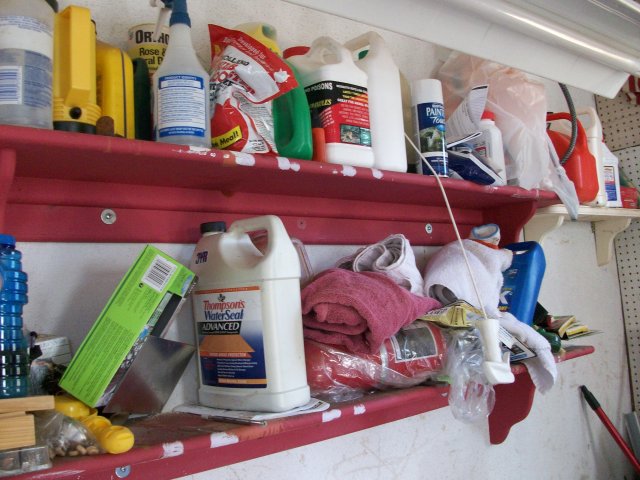This weekend, I was planning to pack up all the old cleaners, paints, and other assorted chemicals that have accumulated in my garage over the last three years and drive them to the town dump. I jumped online yesterday to see how much said disposal might cost, and got quite an education in hazardous household waste (HHW). Made me think twice about the way I’ve been doing things around the house.
What are HHW products and why do they cause problems? Certain household cleaners and home improvement products (think paint thinner, herbicides, oven cleaner, and the like) contain ingredients that are toxic, ignitable, or corrosive. When used on your lawn or poured down your drain, they can make their way into the groundwater and pollute the environment. Greenplanetethics.com has what seems a fairly comprehensive list of what constitutes an HHW and how to identify them in your home.
Here’s a look at some of the nasties in my garage:
According to the Nashua Regional Planning Commission, which controls hazardous waste collection where I live, “when you see the words “caution,” “poison,” “warning,” or “danger” on a product label, you are dealing with a potentially hazardous material that cannot be disposed of as regular waste.” In my town, a $10 fee will allow me to dispose of 10 gallons of material. The EPA’s website states that the average home can accumulate as much as 100 pounds of HHW in the basement and garage and in storage closets. That would be a really big bill!
I’m glad I’m doing something about this stockpile now, before it gets any bigger. Besides the cost, though, there are the kids to consider. You wouldn’t think it, but the older they get, the more creative they get with their play, and you never know what they might do with that bug poison you meant to clean out of the spray bottle (which you never should have used that way in the first place!). And is it really safe to have all these chemicals residing near each other?
The bad news is I can’t just drive these chemicals to the dump any old time. According to our town’s website, HHWs are not accepted there. The good news is that there are designated times and sites for HHW collection; dates are listed for May and June. For anyone who lives in Southern New Hampshire, you may want to check out the Nashua Regional Planning Commission HHW web page for complete details.
From now on, I’m going to make an effort to buy more products that can safely be disposed of in the trash or down the drain. Or make them myself. Under Earth Friendly Alternatives at the NRPC website, there is an impressive list of general and kitchen cleaners that can be made with things I already have around the house – baking soda, vinegar, and lemons, to name a few. Join me in printing it out and tacking it to the fridge as a reminder, if nothing else, to try to be more green. I am psyched to try baby oil as a hand cleaner next time I paint the kitchen cabinets.
“We are living in a false economy where the price of goods and services does not include the cost of waste and pollution,” Lynn Landes, Founder and Director of Zero Waste America.

